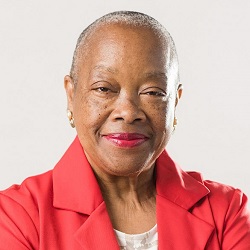Commentary on Genesis 18:20-32
This week’s text continues the story from the three visitors under the Oaks of Mamre.
But the lectionary text skips Sarah’s laughing at the notion that at her age she would have a child, especially since she “ceased to be … after the manner of women,” i.e., she is post-menopausal and presumably unable to have a child (verses 11-14). We miss the three “men” (angels? Theophany-in-three-beings?) turning toward Sodom and Abraham being a good host and accompanying them to set them in the right direction (verse 16). We actually miss the set-up for this week’s text – that is, God’s internal dialogue on whether to tell Abraham what is about to happen.
If we are reading carefully, we don’t know whether “the Lord” is one of the “men,” or is external to this gathering of creaturely beings, including Abraham. We have to acknowledge, if we are honest, that this part of the text is mysterious and odd, like much of the Abraham/Sarah cycle. Abraham MUST know, because he has been “chosen” (verse 19) and he will need to charge his children (yet unborn) and his household (including enslaved or indentured servants) to “keep the way of the Lord” by doing righteousness and justice. What is about to happen, in the internal dialogue of the deity, then, is tied to righteousness and justice. So Abraham must know because apparently Sodom (and Gomorrah) will become an object lesson on what is NOT righteousness or justice. But the preacher who would preach this text must hold that coming tension.
This setup is important as we come to God telling Abraham the “why” of God’s decision.
May I be honest? I am always queasy when “people are going to die” is the answer to “a great outcry against” anyone because of their “grave sin” becomes the reason for death and destruction, even when the actor is God. And we have become inured to divine violence in the text, until and unless someone, in the name of God, decides to bomb, shoot, knife, or otherwise maim whole groups of people “in God’s name.”
That’s the challenge with this text. It is easy to say, “but it’s God.” And yet we live in cultures where we resist text and subtext of divine actions that kill even the people we hate.
Perhaps Abraham’s call to act righteously and with justice is an antidote to what might be divine capriciousness. I am aware that preachers probably can’t call God “capricious,” but preachers should be aware that there may be some people sitting before them who are thinking it’s capricious and may need permission to examine what it means to believe God is inscrutable for no good reason, from their perspective. And is it actually capricious? Does even God grieve what might, in the divine realm, seem to be a necessary loss (some might say evil)?
Abraham’s belief that he is kin to God in righteousness and justice might be reflected in his question in 18:25: “Shall not the judge of all the earth act justly?” It emboldens him to have a conversation with God. He prays.
In addition, listeners might recoil at the notion that God can be bargained with. But there is ample evidence that the deity considers ending all human life form, then relents, or considers a different way. And perhaps it is that history of the mystery of God that makes Abraham ask “will you indeed sweep away the righteous with the wicked” (verse 23).
So the bargaining begins, starting with 50 and going down to 10. My friend, poet Jaha Zainabu wrongly identifies the bargainer as Lot, but her point for this story makes a lot of sense: God had been willing to bargain; why stop at ten?1 I would also add that surely God knows whether even Lot manages to meet the criteria of “righteous and just.” Is killing the unjust the only way, since as Zainabu notes, “I might have been among the sinners had you met me on any random day.”
I suppose that’s at the heart of the challenge this text provides. How do we make allowances for human sin, human collective communal sin, human failings, humanity fraught with the possibility of change and growth? In this text, honestly, preachers may need to bring in Genesis 19 and Ezekiel 16:49, where the sin of Sodom is explained (over against historical interpretations that have led us to connect this episode with sexual sin, especially homosexuality — but that discussion may be well beyond the scope of your sermon).
The preacher will need to know that such thoughts are just on the edge of the people’s mind, even if she decides not to go to that edge.
This text will force preachers to struggle with the radical free will nature of what it means for God to be God. There are places in the Hebrew Bible that tell us God “relents” from decisions sometimes, even as God is free to behave as God chooses (see Joel 2:3, where God’s holding back is put in context of the recurring confession that God is gracious and merciful, slow to anger and abounds in steadfast love. See also, Exodus 34:6 and Numbers 14:18). The contradictory or multivalent nature of God leaves us with the query: “Who knows what God will do?”
At this point, what the “good news” is from this pericope may lie in putting it in good conversation with the other lectionary texts, and with a larger theological vision of God, without pretending that tension is not present in this text. It’s a good, meaty text for preachers to approach if they are not bent on easy answers. We get to explore what God knows that we do not, and what the “for the good of all over against a few” may mean in divine economy of creation. And struggle with the faith that must emanate from us not knowing some things.
Notes:
- Jaha Zainabu, “Dear Lot,” a poem, https://www.youtube.com/watch?v=wABJL5pl8tQ.


July 28, 2019